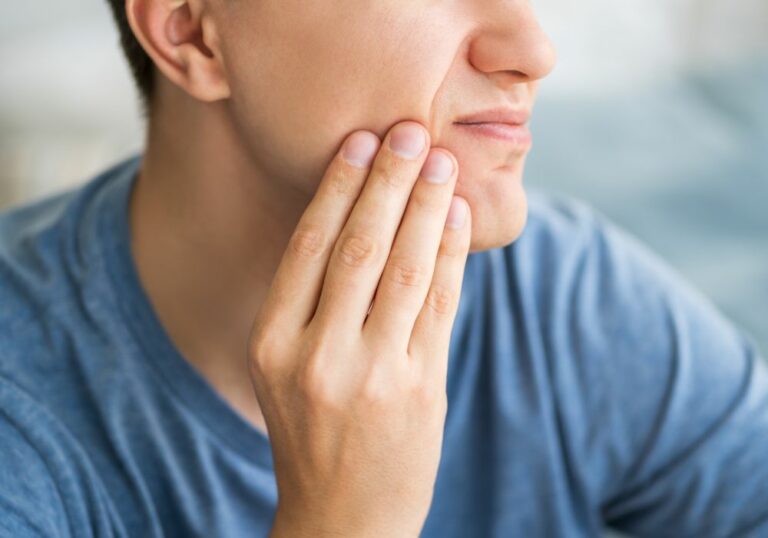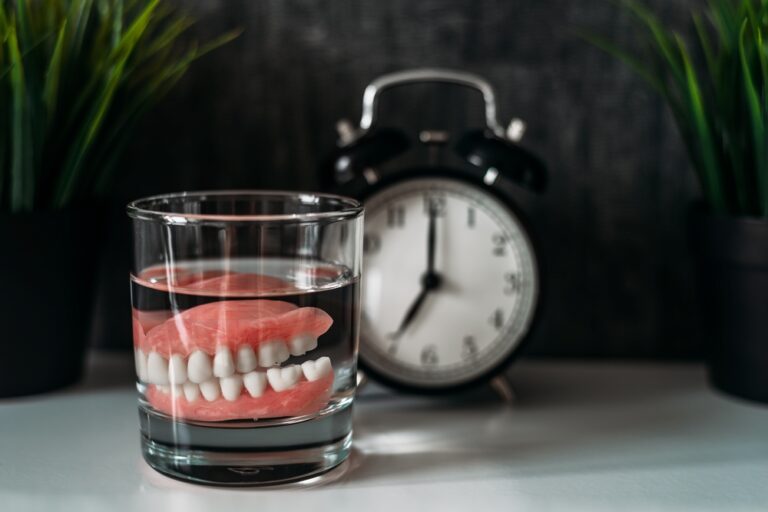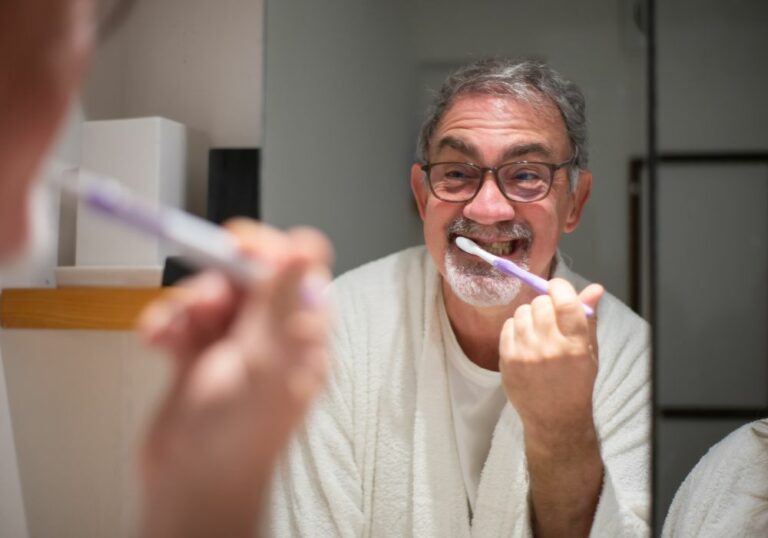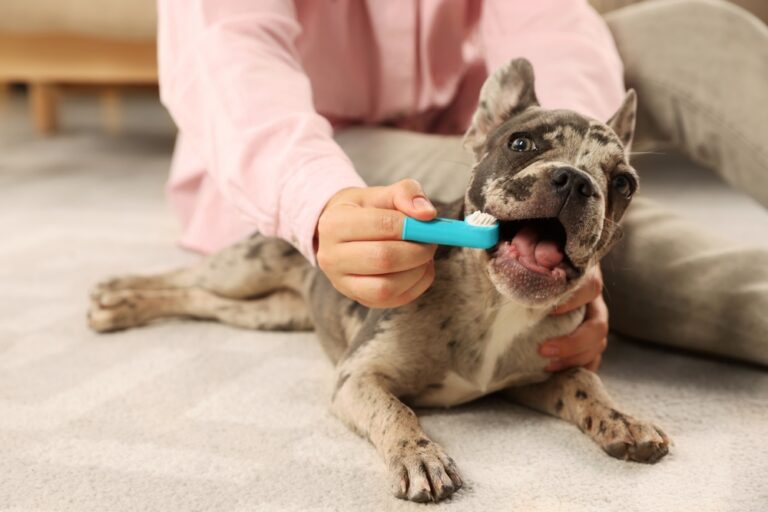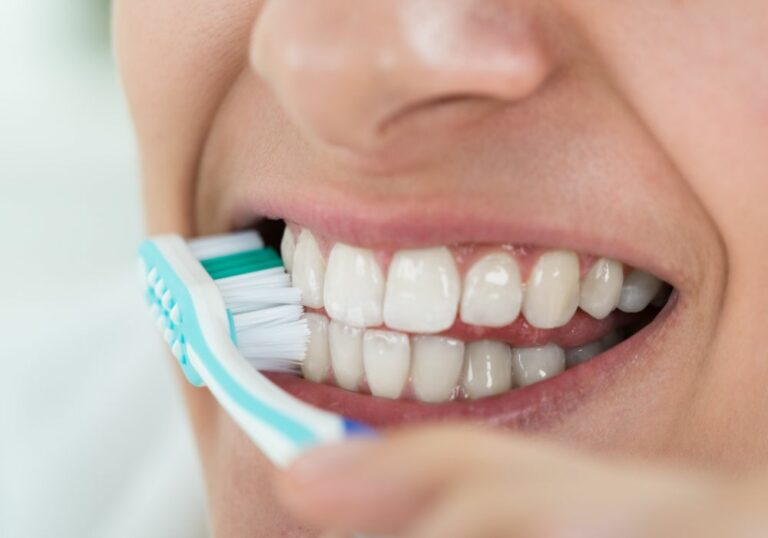For most people, brushing teeth is a routine part of the daily grind. But what should be a simple, painless part of your oral hygiene regimen can quickly turn into a dreaded experience if you deal with tooth and gum sensitivity issues.
But with the right solutions for your situation, you can toss out that stiff old brush causing your misery and learn to brush properly and pain-free. Read on to understand the common causes of brushing discomfort and expert tips to fix them.
Why does brushing hurt my teeth?
For most people, brushing teeth is a routine part of the day that doesn’t cause pain or discomfort. However, if you find yourself dreading your daily oral hygiene because of tooth sensitivity or outright pain when the bristles hit your teeth, there are several potential causes behind the problem.
1. Tooth sensitivity
Tooth sensitivity, also known medically as dentin hypersensitivity, is one of the most common reasons brushing may hurt. Tooth sensitivity occurs when the dentin layer underneath the tooth’s protective enamel coating becomes exposed, often due to enamel erosion, gum recession, cracks or chips in the enamel surface, or improper brushing that wears the enamel down over time.
Dentin contains thousands of microscopic tubules that lead directly to the nerve of the tooth, making it extremely sensitive and vulnerable to pain stimuli. The tubules allow hot, cold, acidic or sticky foods and drinks, brushing pressure, air flow, and even sugary foods to stimulate the nerve and cause sharp sensitivity or pain.
Tooth sensitivity can come and go depending on the stimuli, while long-term exposure of the dentin can make teeth progressively more sensitive overall. Triggers for tooth sensitivity include:
- Using a hard-bristled toothbrush or brushing too aggressively
- Consuming acidic foods and drinks that soften and erode enamel like citrus, wine, carbonated beverages, vinegar, pickles, sour candy and fruit drinks.
- Grinding or clenching teeth at night, which wears down the enamel
- Gum recession, which exposes the sensitive root surface and dentin underneath teeth
- Cracks, fractures or chips in the enamel from trauma or aggressive brushing
- Teeth whitening treatments and professional cleanings, which can irritate the enamel
- Recent dental work like fillings, root canals, tooth extractions, or crowns that can inflame nerves and irritate gums during healing
2. Gum disease
Gum disease is an extremely common oral health problem affecting around 50% of the adult population to some degree. Often going unnoticed in its early stages, gum disease occurs when plaque, a sticky film of bacteria, food debris and saliva, builds up along and underneath the gumlines.
As plaque accumulates, it triggers inflammation and irritation in the gums. Early gum disease is called gingivitis, where you may notice some redness, swelling, bleeding and tenderness in the gums.
If left untreated, gingivitis can advance to periodontitis, which is a more serious infection causing receding, deteriorating gums and damage to tissues and bone supporting the teeth. Pockets or gaps form between the teeth and gums.
All this inflammation and irritation makes the gums extremely sensitive. Brushing over inflamed, swollen gums, or brushing forcefully into infected gum pockets to disrupt plaque, can certainly cause pain and sensitivity when brushing.
3. Tooth decay
Tooth decay, or dental caries, occurs when plaque bacteria begin feeding on carbohydrates from foods and producing acids that erode through tooth enamel and eat away at the underlying dentin. A cavity forms, allowing more bacteria to enter the tooth’s inner layers.
As decay reaches deeper through the dentin to the inner pulp containing nerves and blood vessels, bacteria can infect the root canal system. This causes inflammation, death of the tooth pulp, and abscesses or infection in the bone surrounding the tooth root.
Severe tooth decay allows bacteria easy access to the tooth’s nerves, causing extreme pain with temperature changes or pressure on the tooth, including when brushing over the infected area.
4. Cracked or broken teeth
Cracks, fractures and broken chunks of enamel provide easy entry points for temperature, pressure and irritation to reach the sensitive dentin and nerves inside the tooth. This can cause severe pain when eating, drinking hot/cold liquids, chewing hard foods, or brushing over a cracked site.
Cracks often start small but worsen over time, and broken chunks of enamel quickly lead to decay if left untreated. Any broken spot or crack makes teeth prone to pain when brushing.
5. Recent dental treatments
It’s very common for teeth to become hypersensitive after undergoing certain dental treatments:
- Tooth extractions leave empty sockets vulnerable to irritation. Remaining teeth may shift and experience sensitivity.
- Cavity fillings can irritate and inflame nearby nerves during drilling. Teeth may also experience sensitivity to hot and cold after getting fillings.
- Root canals involve removing the tooth’s pulp and nerves, which can leave surrounding tissues tender during healing.
- Gum surgery, like periodontal cleanings and flap procedures, can irritate the gumline.
- Professional teeth whitening, especially high-concentration bleaching, can make teeth more porous temporarily and expose dentin tubules.
- Crowns require grinding down the existing tooth, which can cause sensitivity near the site.
Post-treatment sensitivity is usually temporary as your mouth heals, often disappearing within several weeks. But long-term sensitivity can also occur. Make sure to discuss any lingering sensitivity issues with your dentist at follow-up appointments.
Tips for brushing teeth without pain
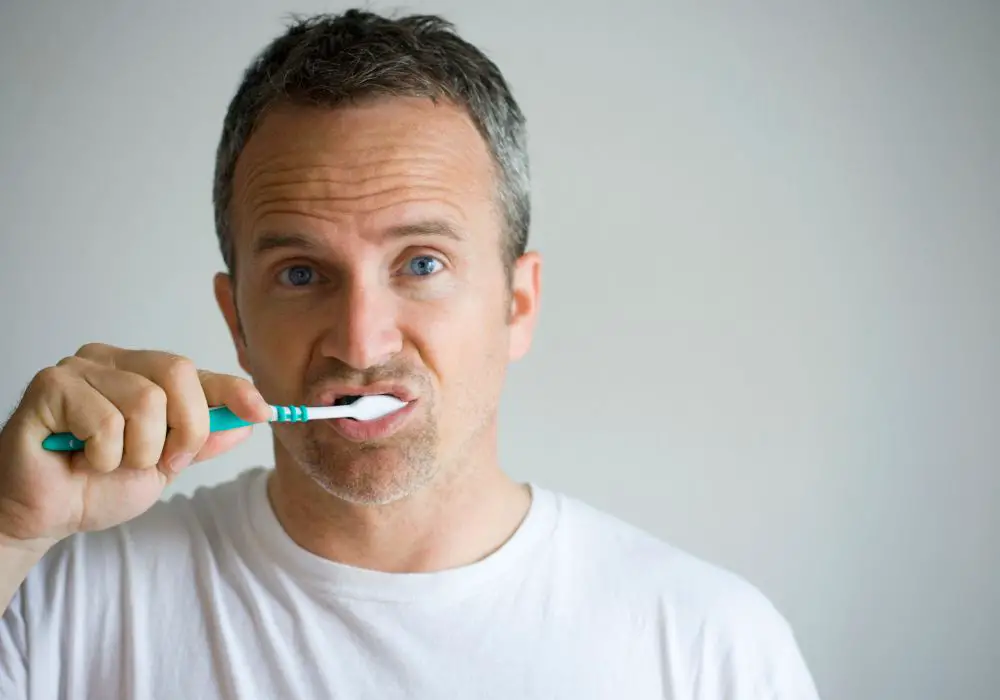
If you experience any degree of tooth or gum discomfort while brushing, there are ways to make your daily oral hygiene routine more comfortable and pain-free:
Use an ultra-soft toothbrush
Using a soft or extra soft bristle toothbrush is gentler on your teeth than medium and hard brushes. Stiff, dense bristles can abrasively wear away enamel over time. The hard pressure of stiff brushes can also push bristles painfully into the gums.
Look for toothbrushes labeled “soft”, “extra soft”, or “ultra soft”. Replace your toothbrush every 3-4 months before bristles become frayed, as worn out bristles are less gentle.
Electric toothbrushes perform brushing motions for you, but still opt for a brush head with soft bristles. Let the device do the work rather than applying added pressure.
Brush gently with minimal pressure
It’s easy to get in the habit of scrubbing too aggressively when brushing, but this excessive pressure risks damaging tooth enamel and abrasively exposing sensitive dentin underneath. Using a soft grip and letting the bristles glide lightly over surfaces is best.
Focus on light, circular massaging motions to clean teeth rather than vigorous back and forth sawing motions that can damage enamel. You want to remove plaque, not scrape away layers of your teeth!
Spend 2 full minutes brushing
Make sure you brush thoroughly for the full recommended 2 minutes to effectively remove disease-causing plaque from all tooth surfaces. Set a timer if needed.
Rushing through brushing means you likely won’t adequately clean each area, while scrubbing too hard or long in one spot can irritate the enamel.
Use desensitizing toothpaste
There are several types of specialty toothpastes formulated to help block dentin tubule transmission and relieve tooth sensitivity. Look for active ingredients like stannous fluoride, arginine, strontium chloride, or potassium nitrate.
It may take several weeks of consistent use for the desensitizing effects to fully kick in, so be patient. Brands like Sensodyne, Colgate Pro-Relief and Crest Gum & Sensitivity provide proven relief.
Rinse mouth with desensitizing products
Over-the-counter mouthwashes can temporarily numb or alter nerve sensation in your teeth to calm sensitivity after brushing. Common active ingredients in mouthwashes include potassium nitrate, stannous fluoride and strontium chloride.
The effects last for a few hours after use. You can also find desensitizing rinses and gels to apply directly to affected areas.
Avoid brushing right after eating/drinking
Foods and beverages with high acidity can soften and erode tooth enamel, making your teeth more vulnerable to pain when brushing over them. Acidic foods to be aware of include citrus fruits, vinegar, wine, soda, sour candy, pickles and fruit juice.
Wait at least 30 minutes after consuming anything highly acidic before brushing to allow your enamel to reharden. Otherwise, you risk brushing away weakened enamel and exposing tender dentin.
Improve your brushing technique
Make sure your brushing technique isn’t exacerbating sensitivity problems in certain areas. Avoid applying extra pressure where gums have receded or enamel is cracked/chipped.
Hold bristles at a 45 degree angle along the gumline and use gentle circular motions rather than vigorous back and forth scrubbing to stimulate gums without irritation. Don’t neglect inside surfaces or back teeth either.
Use milder dental care products
If you have chronic sensitivity issues, switch out your regular dental hygiene products for ones specially designed to minimize discomfort:
- Use a soft bristle brush and brush gently
- Choose toothpastes for sensitive teeth
- Use a mouthwash for sensitive teeth
- Try floss waxed with milder ingredients
Apply ice or cold water
Rubbing ice around sensitive areas for a few seconds before brushing can temporarily numb nerves and reduce pain. Rinsing your mouth with cold water can have a similar numbing effect.
Focus on problem zones
If you know certain teeth or gum areas are prone to discomfort, spend extra time there using the gentlest brushing motions and desensitizing products. But avoid over-brushing one irritated area.
See your dentist
Get professional guidance if sensitivity persists longer than 2 weeks or worsens despite your home care efforts. Your dentist can identify the underlying cause and provide specialized treatments to help. More tips below!
When should I see a dentist for brushing discomfort?
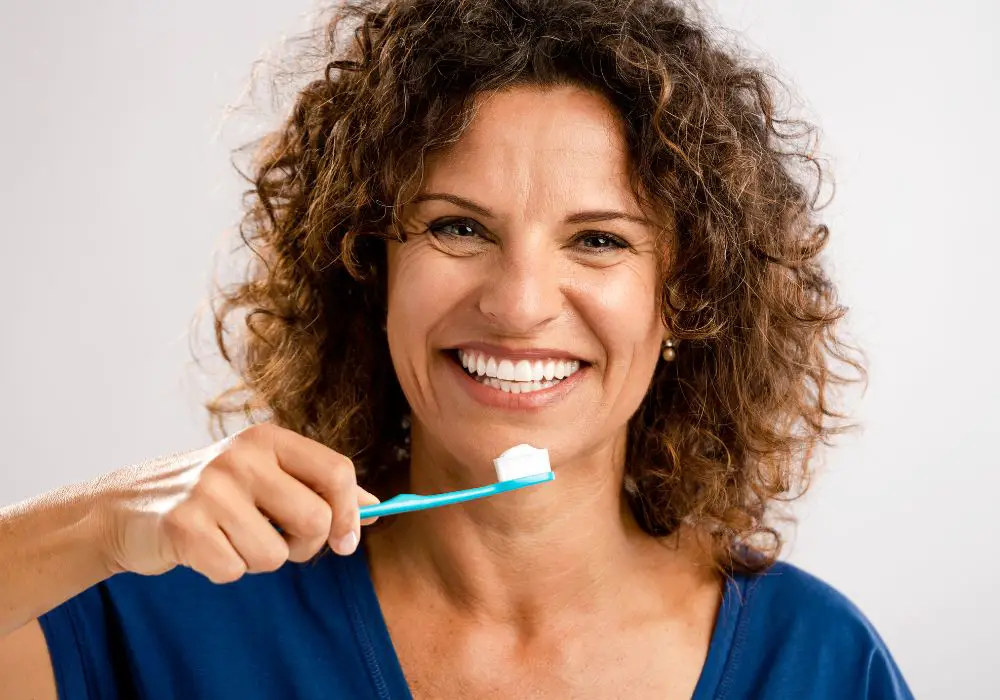
Schedule an appointment with your dentist right away if you experience any of the following warning signs indicative of a dental health problem needing prompt professional treatment:
- Severe toothache or mouth pain lasting over 2 weeks
- Bleeding gums when brushing
- Bright red, swollen or tender gums
- Sudden sharp pains when eating/drinking hot or cold foods
- Tooth sensitivity or pain that wakes you up at night
- Swelling in your jaw, face or neck
- Persistent bad breath or bad taste in your mouth
- Tooth pain not relieved by over-the-counter remedies
- Tooth sensitivity that progressively worsens over time
Potential issues your dentist can identify and treat include:
- Tooth decay – Advanced decay may require fillings, root canals, crowns or tooth extractions to stop progression and save the tooth
- Abscessed tooth – A dental abscess requires draining pus and killing the infection with antibiotics. A root canal may be needed.
- Gum disease – Gingivitis or periodontitis can be treated via dental cleanings, antibiotics and procedures to halt tissue and bone loss.
- Cracked tooth – Cracked teeth must be repaired with crowns, dental bonding, or extracted if too damaged to save.
- Damaged fillings – Rough, cracked or dislodged fillings will need refilling or replacement.
- Grinding/clenching – Custom mouthguards and bite splints can prevent further enamel wear. Muscle relaxants or therapy may help reduce habits.
- Dental injury – Knocked out, displaced or fractured teeth need immediate attention to save.
The sooner you get treatment, the better chance of reversing damage before tooth loss occurs! Let your dentist fully evaluate the cause and recommend solutions to brush without pain again.
How long should I wait to brush again after sensitivity?
If your teeth are so sensitive that even gentle brushing with soft bristles causes sharp pain or discomfort, it’s usually advised to avoid brushing the affected areas for 3-5 days to give the irritated nerves time to calm down.
Restrict brushing to unaffected areas during this time, and rinse your mouth thoroughly with water after eating. You can also apply a fluoride rinse or desensitizing paste with a Q-tip if avoiding brushing certain spots.
However, don’t go longer than 5 days without brushing sensitive teeth, as plaque will rapidly accumulate and likely worsen sensitivity issues. After giving nerves a short break, try brushing again using the most gentle brushing motions possible. Consult your dentist if sensitivity remains severe.
Long-term solutions for sensitive teeth

If you deal with frequent, severe tooth sensitivity and struggle to brush your teeth without pain, there are long-term solutions available from your dentist to provide lasting relief:
Dental bonding
Tooth-colored composite resin material can be applied to cracks, fractures or areas of eroded enamel that are causing sensitivity. The bonding acts like a sealant and filler to cover exposed dentin.
Dental crowns
Crowns fully encase the visible portion of teeth down to the gumline to protect the inner layers of sensitive dentin. Crowns are custom-fitted caps made from tooth-colored porcelain or ceramic, or metal in some cases.
Tooth extraction
Extracting a severely decayed, damaged or infected tooth that is beyond other restorative treatments. Extracting a problematic tooth can halt the spread of infections to surrounding teeth.
Root canal
Opening the tooth pulp and removing infected nerves provides powerful relief for inner decay-related sensitivity. After cleansing, the hollowed inner canal is sealed to prevent reinfection.
Gum graft
A gum graft procedure involves transplanting a small amount of excess gum tissue to cover exposed roots, protecting them from sensitivity triggers. This can reduce gum recession.
Night guard
Wearing a custom night guard prevents grinding/clenching habits from wearing down enamel and dentin at night. This also limits micro-fractures that lead to sensitivity.
Fluoride treatments
Getting regular fluoride treatments or specialized fluoride varnish applications helps strengthen enamel and prevent cavities and sensitivity. Fluoride remineralizes weakened areas.
Desensitizing in-office treatments
Dentists can apply medicated desensitizing gels, rinses, pastes or sealants during an office visit to help numb sensitivity fast before you resume brushing at home.
With diligent oral hygiene using the right soft brushing techniques and products, plus professional treatments as needed, you can manage tooth sensitivity for good. Don’t lose hope – there are always solutions to brush without discomfort!
Frequently Asked Questions
Why are my teeth sensitive to cold after I brush?
If your teeth are sensitive to cold liquids or air right after brushing, it’s likely because brushing has scrubbed away some enamel protection, irritated gum tissue, and exposed tender dentin with open tubules that sense hot/cold stimuli. Using a soft brush and desensitizing toothpaste should help over time.
What toothpaste is best for brushing sensitive teeth?
Toothpastes containing active ingredients like stannous fluoride, arginine, strontium chloride or potassium nitrate work best to treat sensitive teeth and gums. Popular sensitive toothpaste brands include Sensodyne, Colgate Pro-Relief, Crest Gum & Sensitivity, Tom’s of Maine Sensitive, and Hello Sensitivity Relief.
Can I brush with baking soda for sensitivity?
Baking soda is a mildly abrasive natural cleaner that can remove some stains, but it may be too harsh for brushing sensitive teeth frequently. Scrubbing hard with baking soda could eventually damage enamel and worsen sensitivity. Using a soft brush and desensitizing toothpaste is gentler long-term.
How can I tell if tooth sensitivity is from a cavity versus enamel loss?
It’s often hard to distinguish tooth sensitivity caused by a cavity versus eroded enamel. Cavity discomfort is often sharp, sudden pain from hot/cold foods. Sensitivity from enamel erosion causes more mild, constant discomfort. Seeing a dentist is the only sure way to determine the exact cause and needed treatment.
What home remedies temporarily relieve tooth sensitivity?
Some natural home remedies to try for temporary sensitivity relief include rubbing gums with aloe vera gel, using coconut oil as a mouth rinse, chewing sugar-free gum to stimulate more saliva flow, drinking green tea to block nerve sensations, applying a paste of baking soda and water, and rinsing with warm salty water.

